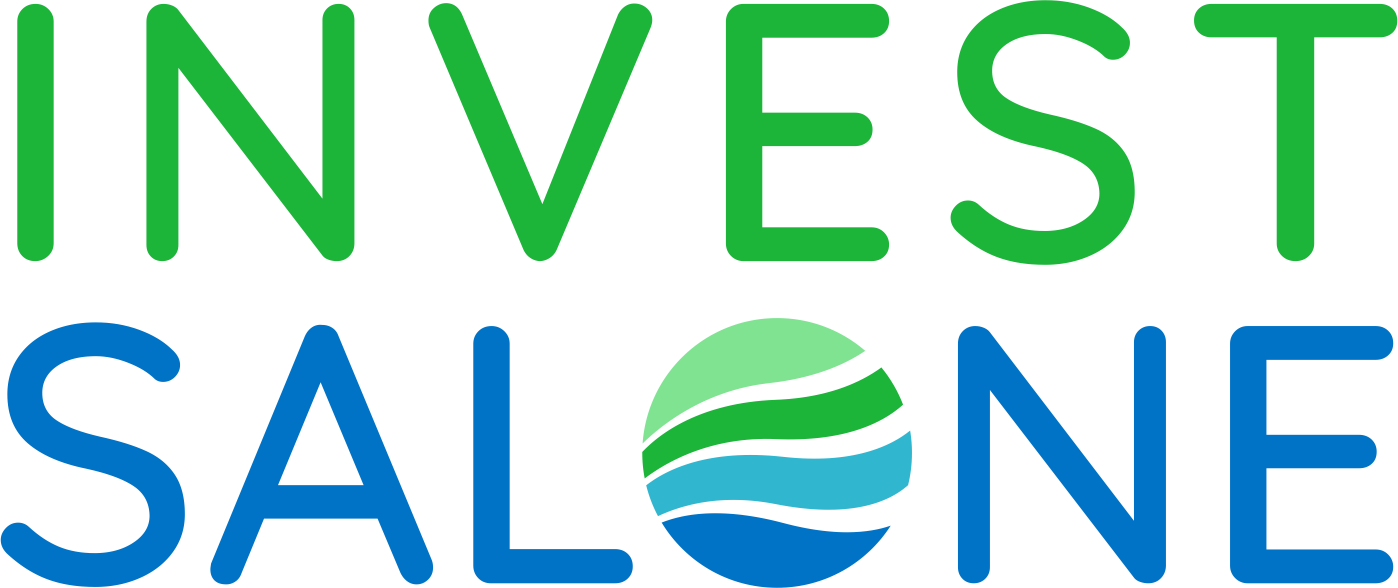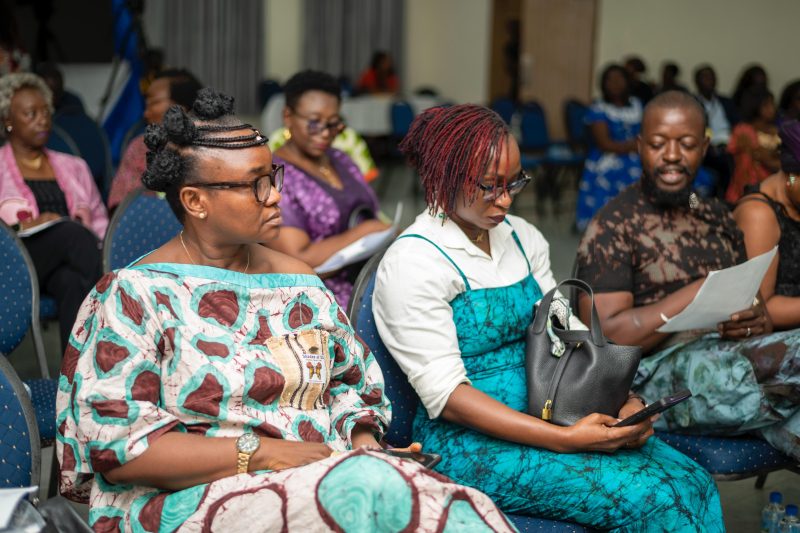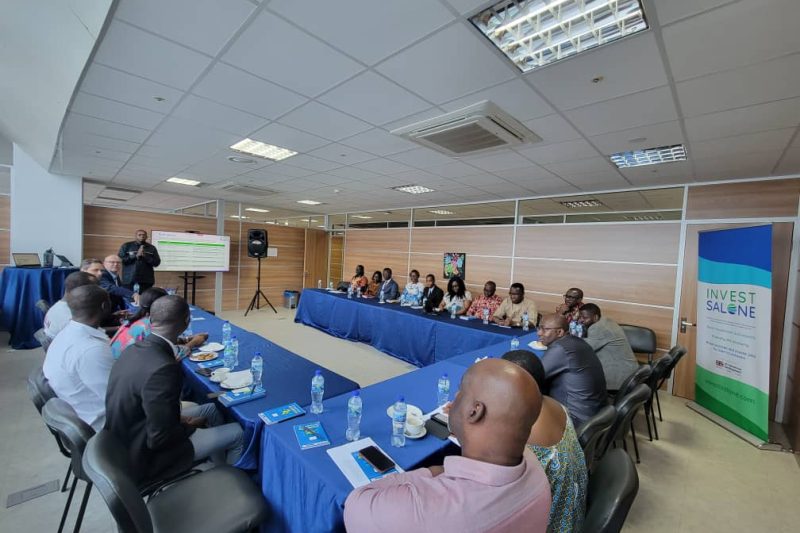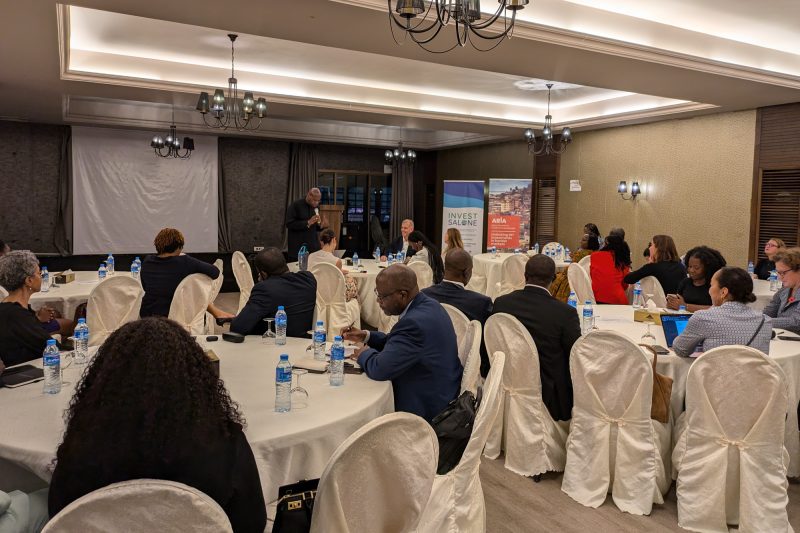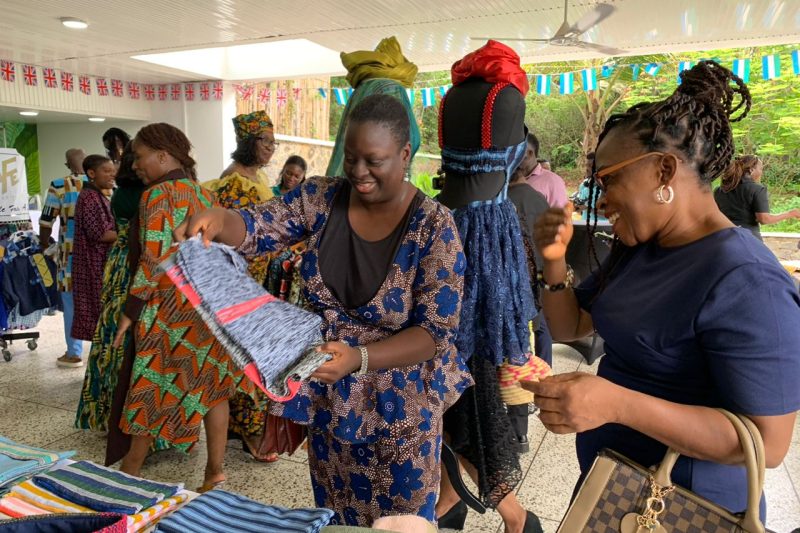At a fabrics and fashion roundtable held on 26 January 2023, businesses expressed their support for ‘Made in Sierra Leone’ quality certification, led by the Sierra Leone Local Content Agency (SLLCA), and said that the fashion industry would welcome the opportunity to pilot such a scheme.
Over 19 participants from across the private and public sectors attended the meeting to discuss how ‘Made in Sierra Leone’ certification could showcase Sierra Leonean fashion internationally and underpin standards, as well as educate consumers about the positive impact of buying locally. The participants included Chief Director Emmanuel Konjoh and four technical staff from the Ministry of Trade, SLLCA Director Thomas Bockarie, and several top Sierra Leonean designers.
The meeting was facilitated by Invest Salone, the UK-funded private sector development initiative. In his welcome, Invest Salone Team Leader Chukwu-Emeka Chikezie said that a ‘Made in Sierra Leone’ certification would act like a kitemark, indicating products had met certain standards. “Such an independent assurance of quality and provenance would be valuable in helping manufacturers market their products and attract new audiences, by creating trust and helping consumers make informed purchasing decisions,” he explained.
He was followed by consultant Emma Fofanah, who presented findings from an Invest Salone study into the viability of a ‘Made in Sierra Leone’ scheme for the fashion sector. This was based on discussions with the SLLCA, an analysis of similar certification schemes, and a survey of 14 Sierra Leonean fashion and textile businesses.
The study showed that schemes such as ‘Made in Rwanda’, ‘Proudly South African’ and ‘Made in Kenya’ had certain qualities in common. These included government involvement and commitment, benefits to the producer and consumer, a clear application process and criteria, and certification fees.
Survey respondents indicated overwhelming support for the idea of a subscription-based ‘Made in Sierra Leone’ certification scheme. Expected benefits include local and international brand exposure, authentication, investment opportunities, increased customers, discount shipping and training. Respondents agreed that criteria for ‘Made in Sierra Leone’ certification should include the origin of inputs, percentage of local resources used, and quality of the product. In addition to relevant government institutions such as the SLLCA, National Tourist Board and Standards Bureau, respondents also said that individuals and institutions who understand the fashion industry should be included in the certification process.
The SLLCA is planning to pilot the ‘Made in Sierra Leone’ scheme through the agribusiness sector, and : “The fashion and fabric sector has great potential for boosting jobs, exports and manufacturing, and because the process of certifying ‘Made in Sierra Leone’ for clothing and fabric would not be as complicated as certifying agricultural produce, it would be less resource intensive to implement.”
In the discussion that followed, Director Konjoh said that campaigns to encourage domestic production are often supported with demand-side policies to encourage consumer demand: “In Rwanda it is against the law to import used clothing, and in Kenya the tariff to import new clothing is 45%. Introducing policies such as these in Sierra Leone will require strong political will.” He went on to say that the quality of Sierra Leonean goods and services was internationally competitive, and that investing in marketing could help Sierra Leonean businesses tap into the opportunities offered by Africa’s growing middle class.
As the government is the largest purchaser of goods and services, the SLLCA would like to see the introduction of a requirement for each ministry, department and agency to make public the percentage of their annual budget allocated for expenditure on locally produced goods and services, said Director Bockarie, adding that effecting such a policy shift would require a coordinated approach from all parties.
Coordination emerged as a central theme of the dialogue. Mary-Ann Kai Kai, creative director of Madam Wokie, highlighted the need to bring on board a wider spectrum of businesses from the fabrics and fashion sector, saying: “We need to interact with traders on Malama Thomas street and make them part of the discussion.”
Industry participants also raised the need to standardise garment sizing, invest in skills and capacity building, and engage the industry on trademark and copyright issues.
The meeting concluded with a plan for progressing ‘Made in Sierra Leone’ certification for the fashion and textiles industry. This includes an online platform to showcase the domestic fashion industry, defining and agreeing the criteria for ‘Made in Sierra Leone’ certification, identifying schemes which address access to finance, and an agreement that SLLCA will bring the Ministry of Trade, the World Bank and Invest Salone together to discuss incentives, public procurement and matchmaking.
